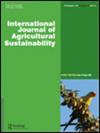Drivers and challenges of large-scale conversion policies to organic and agro-chemical free agriculture in South Asia
IF 3.3
2区 农林科学
Q1 AGRICULTURE, MULTIDISCIPLINARY
International Journal of Agricultural Sustainability
Pub Date : 2023-10-30
DOI:10.1080/14735903.2023.2262372
引用次数: 0
Abstract
Addressing global environmental and food challenges necessitates holistic approaches that consider environmental, societal, and economic dimensions. This study examines three large-scale organic farming conversion programs and their associated policies in Sikkim, India, Bhutan, and Sri Lanka. Sikkim stands as the world's first state to fully transition to organic agriculture, while Bhutan is embarking on a similar path, and Sri Lanka is implementing a toxin-free program. A qualitative analysis reveals key drivers and barriers in these large-scale conversions. Five crucial factors for successful transitions to large-scale organic farming emerge: effective institutional leadership, affordable third-party certification, phased reduction of agrochemicals through clear political pathways, development of extension networks, market access with price premiums, and the provision of organic inputs. Key drivers include improving rural livelihoods, upscaling traditional farming practices, addressing health concerns related to agrochemicals, and preserving natural resources. Significant challenges include shortages of organic inputs, limited market access, inadequate food supply, a lack of knowledge about alternative practices and inputs, and high certification costs. In addressing these factors and challenges, policymakers and scientists can better navigate the complex landscape of large-scale organic farming conversion.南亚有机农业和无农药农业大规模转化政策的驱动因素和挑战
解决全球环境和粮食挑战需要考虑环境、社会和经济层面的整体方法。本研究考察了锡金、印度、不丹和斯里兰卡的三个大规模有机农业转化项目及其相关政策。锡金是世界上第一个全面过渡到有机农业的国家,不丹正在走上类似的道路,斯里兰卡正在实施一项无毒计划。一项定性分析揭示了这些大规模转换的关键驱动因素和障碍。成功过渡到大规模有机农业的五个关键因素出现了:有效的机构领导,负担得起的第三方认证,通过明确的政治途径分阶段减少农用化学品,发展推广网络,以溢价进入市场,以及提供有机投入。主要驱动因素包括改善农村生计、改进传统耕作方式、解决与农用化学品有关的健康问题以及保护自然资源。重大挑战包括有机投入物短缺、市场准入受限、食品供应不足、缺乏替代做法和投入物知识以及认证成本高。在解决这些因素和挑战的过程中,决策者和科学家可以更好地驾驭大规模有机农业转化的复杂局面。
本文章由计算机程序翻译,如有差异,请以英文原文为准。
求助全文
约1分钟内获得全文
求助全文
来源期刊

International Journal of Agricultural Sustainability
AGRICULTURE, MULTIDISCIPLINARY-GREEN & SUSTAINABLE SCIENCE & TECHNOLOGY
CiteScore
5.90
自引率
23.50%
发文量
33
审稿时长
>12 weeks
期刊介绍:
The International Journal of Agricultural Sustainability ( IJAS) is a cross-disciplinary, peer-reviewed journal dedicated to advancing the understanding of sustainability in agricultural and food systems.
IJAS publishes both theoretical developments and critical appraisals of new evidence on what is not sustainable about current or past agricultural and food systems, as well as on transitions towards agricultural and rural sustainability at farm, community, regional, national and international levels, and through food supply chains. It is committed to clear and consistent use of language and logic, and the use of appropriate evidence to substantiate empirical statements.
IJAS increases knowledge on what technologies and processes are contributing to agricultural sustainability, what policies, institutions and economic structures are preventing or promoting sustainability, and what relevant lessons should be learned.
 求助内容:
求助内容: 应助结果提醒方式:
应助结果提醒方式:


